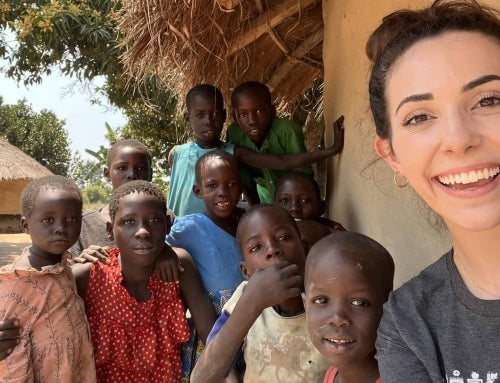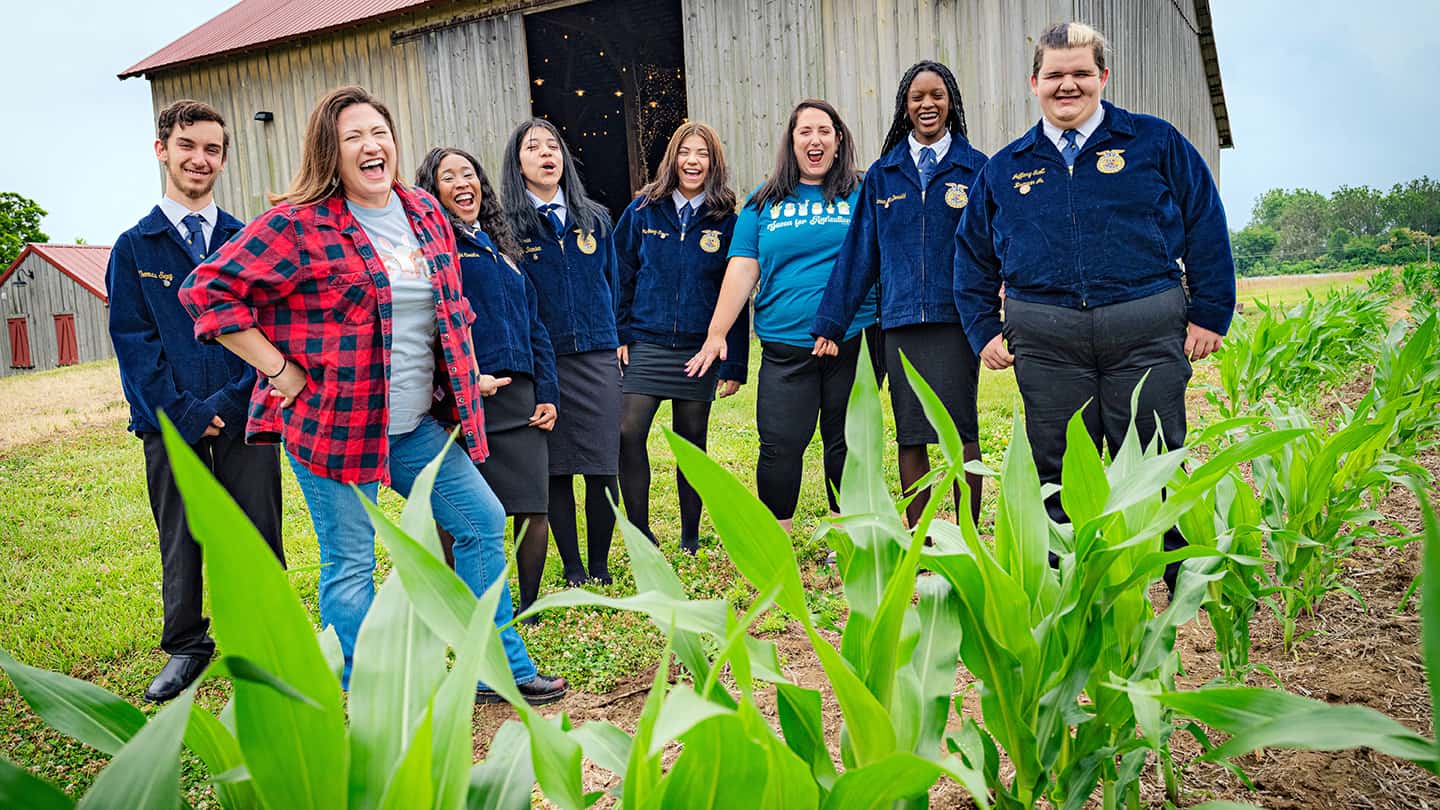 Makayla Counts was in middle school when she decided she wanted to be a farmer. There was just one problem: Counts didn’t grow up on a farm and had no experience growing crops or raising animals. That changed when she enrolled at William Penn High School in Delaware’s New Castle County.
Makayla Counts was in middle school when she decided she wanted to be a farmer. There was just one problem: Counts didn’t grow up on a farm and had no experience growing crops or raising animals. That changed when she enrolled at William Penn High School in Delaware’s New Castle County.
“So many kids don’t have the opportunity to work on a farm,” Counts says. “Penn Farm has been really great because I’ve always loved animals, and I get to work with chickens and goats and ducks.”
Counts is among the 300 students taking agriculture classes at William Penn High School. The FFA members help feed the goats and chickens, gather eggs, clean coops and stalls, grow fruits and vegetables, and cultivate ornamental plants on the adjacent historic farm.
Taking a Bite Out of History
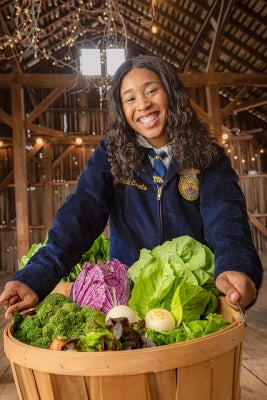
Makayla Counts
Historic Penn Farm has a storied history. In 1701, William Penn, founder of the Province of Pennsylvania, set aside more than 1,000 acres of land in New Castle, Del., for the benefit of local citizens.
The parcel, known as the New Castle Common, was later divided into tenant farms, where farmers grew corn and peaches and raised cattle, pigs and chickens. The 100-acre Penn Farm represents the last surviving farm of the original acres, which are managed by the Trustees of New Castle Common.
William Penn High School partnered with the trustees to lease land for its agricultural and culinary program. The “farm-to-school” program was introduced in 2003 to provide hands-on education in plant and animal science and to supply nutritious foods to students within the Colonial School District.
The fact that the farm is located in an urban school district where students don’t have a lot of exposure to agriculture makes the program especially impactful, according to animal science teacher and FFA advisor Karen Ferrucci.
“A lot of these kids may never go outside, never touch a vegetable, never plant a flower, never feed a goat,” she says. “They get to take a lot of ownership [of the farm] and they get to eat the fruits and vegetables and enjoy the spoils of their labor.”
Grants from the U.S. Department of Agriculture Farm to School Grant Program and Specialty Crop Block Grant Program have helped offset the cost of operating the farm.
The school currently leases eight acres of farmland to grow vegetables and fruits, including a small orchard and berry bushes. An apiary and pollinator habitat are also tended. The campus farm also raises chickens and goats. In 2021, 17,168 pounds of produce were harvested on the farm and used to provide more than 141,000 meals through the district’s summer meal program.
“We grew from just small plots of ground to what we are today,” says Toby Hagerott, farm manager for Penn Farm and the Colonial School District. “We established a teaching garden and expanded our farm tours to include preschool, elementary school students and middle school students … and we’ve been expanding on what we’re growing and how we’re growing to serve the community and the school.”
Embracing Farm-to-Table
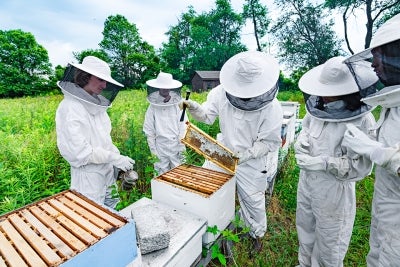 Students in plant science classes manage all aspects of production, from sowing seeds and transplanting to watering and harvesting.
Students in plant science classes manage all aspects of production, from sowing seeds and transplanting to watering and harvesting.
The nutrition services department serves fresh produce and processes, freezes and vacuum seals additional fruits and vegetables to ensure the summer bounty can be featured on the district’s menu throughout the year.
“Grown by Students, for Students” signs are featured in the cafeterias to educate students about where the food comes from. Seeing the signs posted is a source of pride for the FFA members who worked hard to get the food from farm to table.
“Agriculture is a hard sell to some of our students, but being a part of the growing process from start to finish gives kids a sense of accomplishment,” says Katie Hawkins, plant science teacher and FFA advisor. “Students get to grow, cultivate and harvest foods that they get to use in culinary classes or they get to see it in the cafeteria. We stress the importance of growing these crops so that others in our community can have access to fresh locally grown produce.”
For Counts, one of the biggest rewards of working on Penn Farm is knowing that 50% of the food is served to her fellow students.
“Giving back to my community is my main goal in life,” she says. “I’m helping to feed kids who don’t always get to have three meals a day; it’s such a blessing that I’m able to do this.”
The school also operates a community-supported agriculture (CSA) program, selling boxes of fresh produce to community members. It’s been a popular program because there aren’t many farms in New Castle.
In 2016, the CSA program had 30 members and grew to 70 members last season. The funds from the sale of CSA shares support minor operating costs for the farm and serve as a scholarship source for FFA student leadership events.
Cultivating Career Readiness
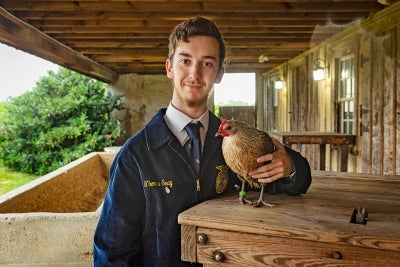
Thomas Seay
The Penn Farm program is part of a comprehensive career and college readiness curriculum at William Penn High School.
In addition to learning about plant and animal sciences, students have the option to pursue Occupational Safety and Health Administration (OSHA) certification and pesticide certification through the Delaware Department of Agriculture. The school also hires students for summer jobs through the county youth employment program.
Thomas Seay, 16, has worked on Penn Farm for the past two summers.
“I wanted to get more experience in agriculture and work with animals,” he explains.
Seay has also gained experience with animals through animal science classes. He’s doing a poultry project for his supervised agricultural experience. His silver Phoenix and Polish chickens and mallard and Pekin ducks have names and personalities — and Seay spoils them.
For his agriscience fair project, Seay is growing black soldier flies to feed to the flock for treats, and he hopes to show his poultry at the county fair.
Seeing students embracing opportunities to get their hands dirty and develop career skills is one of the biggest reasons Ferrucci loves the Penn Farm program.
“Agriculture programs are the underdogs in this area,” she says. “By taking advantage of urban agriculture and the farm-to-fork movement, we were really able to gain a lot of momentum.”
Growing Future Leaders
The Penn Farm program isn’t just focused on growing food and raising animals; the goal is also to grow future leaders.
Seay credits FFA with building his knowledge and his confidence. He’s the chapter secretary and a booster who encourages other students to take agricultural education classes and join the FFA chapter. It’s a big departure for the self-described shy student who joined the program.
For Counts, a first-generation FFA member and the first African-American female chapter president, self-empowerment has been a big benefit of the program, but the future farmer and passionate environmentalist is also taking full advantage of the networking opportunities.
Counts connected with delegates from other chapters at the state and national FFA conventions and met Congresswoman Lisa Blunt Rochester, the first woman and first African American to represent Delaware in Congress. Counts also secured a scholarship to study agriculture at University of Maryland Eastern Shore this fall.
“The congresswoman gave me that inspiration to realize that I could help my community in any way, shape or form,” she explains. “The farm and FFA have been such life-changing experiences because now I can go out there confidently and speak about anything that I’m passionate about.”











